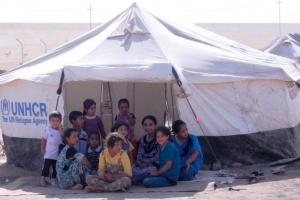UN reports serious human rights violations, potential war crimes in Iraq
The group known as the Islamic State of Iraq and the Levant (ISIL) and its allies are imposing “untold hardship and suffering” on Iraqi civilians, the United Nations said in a report that also casts doubt as to whether Iraqi security forces (ISF) and associated forces have done enough to protect civilians during hostilities.

Khazir camp for Internally Displaced Persons, Iraq.
The report, compiled by the UN Assistance Mission for Iraq (UNAMI) and the UN human rights office (OHCHR), is based on direct monitoring activities as well as a variety of sources, including civilian victims and witnesses, of events between 5 June and 5 July.
It documents ISIL and allies carrying out “large-scale killings, injuries and destruction and damage of livelihoods and property,” according to OHCHR, including in “markets, restaurants, shops, cafes, playgrounds, schools, places of worship and other public spaces where civilians gather in large numbers.”
“ISIL and associated armed groups have carried out many of these attacks in a systematic manner heedless of the impact on civilians, or have systematically targeted civilians and civilian infrastructure with the intention of killing and wounding as many civilians as possible,” the report states.
At least 1,531 civilians were killed in Iraq last month and 1,763 were wounded, according to UN figures. Some 1.2 million Iraqis have been internally displaced as a result of the violence – including over 600,000 since the beginning of June alone.
The report also documents violations committed by ISF and associated forces, including summary executions and extrajudicial killings of prisoners and detainees, “which may also amount to war crimes.”
Report authors also raised concerns about whether ISF and affiliated forces adhered to the principle of distinction and proportionality.
“International law requires that both the Iraqi State and armed groups take all measures to minimize the impact of violence on civilians,” said Nickolay Mladenov, the Secretary-General’s Special Representative for Iraq and head of UNAMI.
He stressed that, in addition, State and armed groups must “respect the principles of distinction and proportionality when carrying out military operations,” as well as “take steps to ensure the safety and protection of civilians by enabling them to leave areas affected by violence in safety and dignity, and to access basic humanitarian assistance at all times.”
The report also notes that children have been disproportionately affected by the conflict.
“In all conflict-affected areas, child casualties due to indiscriminate or systematic attacks by armed groups and by Government shelling on populated areas have been on the rise,” it states. “Credible information on recruitment and use of children as soldiers was also received.”
UN High Commissioner for Human Rights Navi Pillay said she was particularly concerned about the protection and welfare of members of vulnerable groups who remain in areas affected by the armed conflict, especially women, female-headed households, children, people with disabilities, the elderly, and members of minority groups.
“Every day we receive accounts of a terrible litany of human rights violations being committed in Iraq against ordinary Iraqi children, women and men, who have been deprived of their security, their livelihoods, their homes, education, healthcare and other basic services,” she said.
“The deliberate or indiscriminate targeting of civilians, the killing of civilians, the use of civilians as shields, the hindering of access for civilians to humanitarian assistance may amount to war crimes or crimes against humanity,” she added.
The Government of Iraq is obligated to investigate serious violations, she stressed, and to hold the perpetrators to account.
Senior UN officials, including Mr. Ban, have reiterated the importance of a solution based on inclusive political and social processes that will address the concerns of all communities.
Mr. Mladenov noted that now that a Speaker of Parliament has been elected, “it is vital that Iraqi leaders quickly move forward on the nomination of a new President and a new Government.”
Meanwhile, the UN High Commissioner for Refugees, António Guterres, warned that Iraq risks “full-fledged sectarian war and complete fragmentation” as Iraqis continue to flee their homes and minority groups are targeted.
Iraqi politicians and the international community are “running out of time to act,” said the UN refugee chief, who arrived in the country earlier this week and witnessed the dire conditions facing some those uprooted by the violence.
Source: UN News
- 449 reads
Human Rights
Fostering a More Humane World: The 28th Eurasian Economic Summi

Conscience, Hope, and Action: Keys to Global Peace and Sustainability

Ringing FOWPAL’s Peace Bell for the World:Nobel Peace Prize Laureates’ Visions and Actions

Protecting the World’s Cultural Diversity for a Sustainable Future

Puppet Show I International Friendship Day 2020

